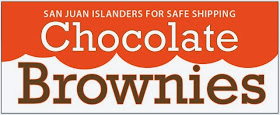Good folks at the San Juan County Fair Safe Shipping booth are selling brownies in four flavors, including Bakken Shale Brownies with Caramel Crude. Funds raised this week and weekend go to spreading the message of Safe Shipping in the Salish Sea.
San Juan Islanders For Safe Shipping write: “Our goal is to raise awareness of the increasing number of proposed terminal projects that will increase vessel traffic and multiply the risk of oil spills in the waterways just outside our front doors -- the waters that wash up on our favorite beaches. We are especially concerned about increases in tanker traffic transporting crude oil -- crude oil spills are the most damaging and most difficult to cleanup.
“The specific target of our action at the County Fair is the Kinder Morgan Trans Mountain pipeline expansion project -- poised to increase the number of tankers seven-fold per month. We islanders need to talk to Canada and let them know we won't let that happen without them putting the safest of precautions in place. Right now, Canada is not capable of effectively cleaning up an oil spill, and that is just not acceptable to us -- especially when we stand to lose nearly 80% of our county's economy should such a disaster happen. And for what? 50 permanent jobs for Canadians and hundreds of millions of dollars in profits to Kinder Morgan....”
OK, maybe it’ll take more than eating brownies but all that we do to save our Salish Sea should at least include brownies. Eat on!
--Mike Sato


